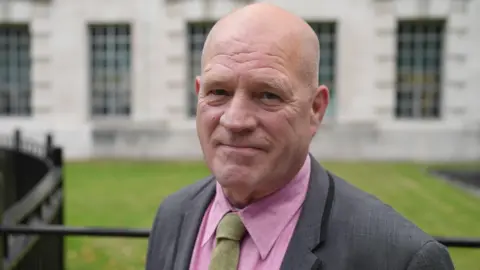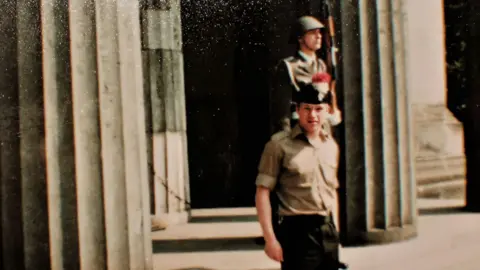
 ANN GANNON/BBC
ANN GANNON/BBC
Stephen Close lived as a convicted sex offender for three decades before being pardoned in 2013
LGBT veterans dismissed from the armed forces because they are gay will be eligible for compensation of up to £70,000, the government announced on Thursday.
The Ministry of Defense said the move followed extensive contacts with LGBT veterans and campaigners.
Ministers will also announce that veterans can apply to have their rank reinstated and the reason for discharge changed.
The total amount available to affected veterans will be increased from a proposed £50 million to £75 million.
Applications open on Friday for LGBT veterans who have been discharged or discharged because of their sexual orientation or gender identity to receive £50,000.
Additional payments of up to £20,000 will also be available for those negatively affected by the ban on LGBT staff between 1967 and 2000.
This targets those who have been victims of harassment, invasive investigations and those who have been sent to prison.
The exact amount of additional compensation is determined by an independent panel.
All payments are exempt from income tax and do not affect income-related benefits.
Homosexuality was decriminalized in Britain in 1967, but the ban remained in place in the armed forces until 2000.
Those who were or were deemed homosexual were often subjected to lengthy investigations before being discharged from the military.
‘Constant struggle’
Stephen Close, who joined the army at the age of 18, said he is hoping for some financial compensation.
Mr Close was convicted of the sexual offense of gross indecency after kissing another man while stationed in Berlin in the 1980s.
He lived as a convicted sex offender for 30 years before being pardoned in 2013.
“Because of my criminal record I’ve had to go from job to job. I haven’t built up a pension at all. I have no savings. I’ve never been on holiday. I don’t think I’ve ever done that. Everything is new, it’s my It’s been a constant struggle all my life,” Close told the BBC.
 STEVEN CLOSE
STEVEN CLOSE
Stephen Close was sent to military prison after officers discovered he had kissed another man
“Mentally it has been absolutely terrible. I have suffered from depression, anxiety and panic attacks for years,” Mr Close added.
Despite this, he said he is still “proud” to have served his country.
A National Audit Office report shows that up to 4,000 veterans are expected to be eligible for compensation.
The LGBT Veterans Independent Review, led by Britain’s first openly gay judge, Lord Etherton, revealed decades of harassment, abuse and deportations of LGBT servicemen and women, often leaving them without income or pensions.
When the report was published, then Prime Minister Rishi Sunak apologized in Parliament and called the ban “an abhorrent failure” by the British state.
The Government says the £75 million available is significantly above the level recommended in the Etherton Review.
Veterans can join the scheme from Friday 13 December.

Leave a Reply